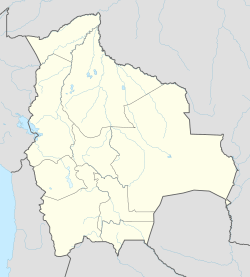Tarabuco Municipality facts for kids
Quick facts for kids
Tarabuco Municipality
Tarapuku munisipyu
Municipio de Tarabuco
|
|
|---|---|
|
Municipality
|
|
| Country | |
| Department | Chuquisaca Department |
| Province | Yamparáez Province |
| Incorporated (municipality) | 18 November 1912 |
| Seat | Tarabuco |
| Area | |
| • Total | 395 sq mi (1,023 km2) |
| Elevation | 11,500 ft (3,500 m) |
| Population
(2001)
|
|
| • Total | 19,554 |
| • Ethnicities | Yampará (Quechua) Aymara other indigenous Guaraní |
| Time zone | UTC-4 (BOT) |
| INE | 010601 |
The Tarabuco Municipality is a special area in Bolivia. It is the first municipal section of the Yamparáez Province in the Chuquisaca Department. The main town, or "seat," of this municipality is Tarabuco.
Many people living in Tarabuco Municipality are from indigenous groups. In 2001, out of 10,530 people aged 15 or older, 9,834 (about 93%) identified as indigenous. Most of these were from the Quechua group. There were also some Aymara and Guaraní people.
Contents
Understanding Tarabuco Municipality
What is a Municipality?
A municipality is like a local government area. It helps manage services and rules for the people living there. Tarabuco Municipality is one such area in Bolivia. It was officially created on November 18, 1912.
Where is Tarabuco Located?
Tarabuco Municipality is found in the Chuquisaca Department of Bolivia. It is part of the Yamparáez Province. The main town, Tarabuco, is located at an elevation of about 3,500 meters (11,483 feet) above sea level.
People and Culture
Who Lives in Tarabuco?
The people of Tarabuco Municipality are mainly indigenous. This means they are descendants of the original inhabitants of the land. The largest group is the Quechua people. They have a rich history and culture.
Voting for Self-Rule
On December 6, 2009, the people of Tarabuco Municipality made an important decision. They voted to have "indigenous autonomy." This means they wanted more control over their own local government and how their community is run. A large majority, 90.8% of the voters, supported this idea. This allows them to make decisions that fit their unique cultural traditions.
See also
 In Spanish: Tarabuco para niños
In Spanish: Tarabuco para niños


